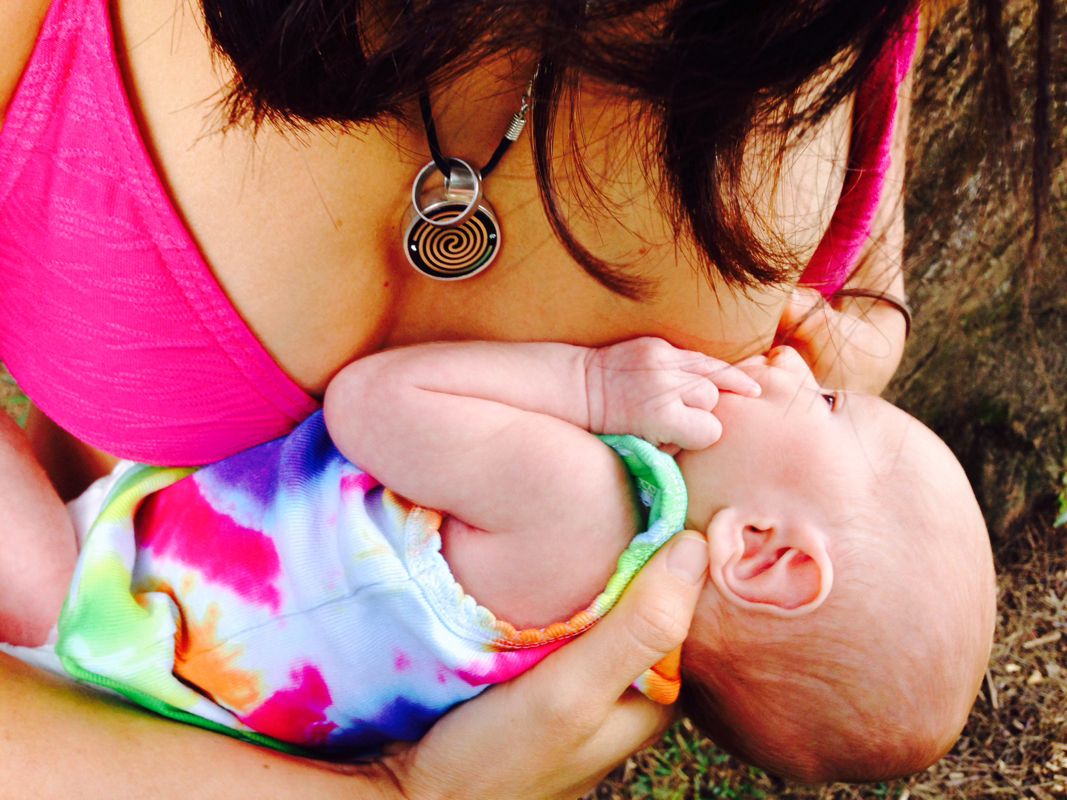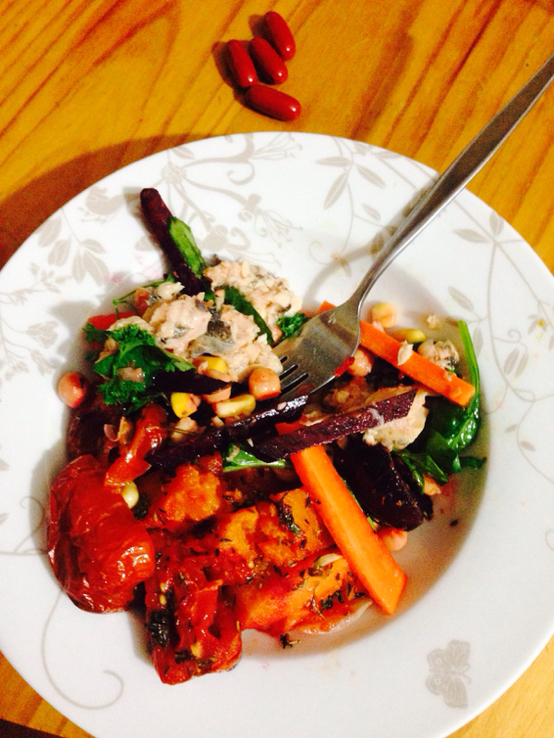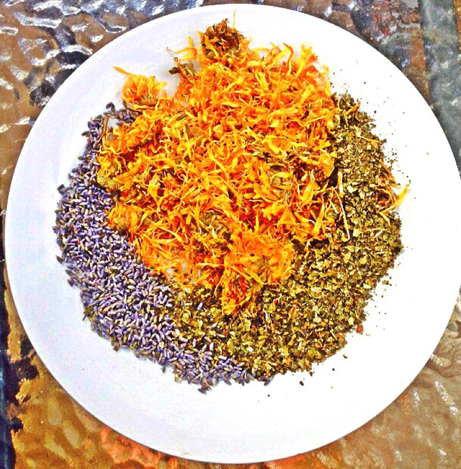Nutrition, Herbs, and other Goodies for Postpartum Wellbeing
When well-meaning friends with kids repeatedly suggested we prepare meals and freeze them to prepare for the hectic few weeks that follow a child's arrival, we nodded our heads and promptly forgot their advice, foolishly thinking that surely we'd have time to shop, cook and clean whilst learning how to be parents and suddenly becoming full-time carers to a tiny human.
It really isn't as bad as it sounds. Producing milk requires the release of prolactin which amongst other things, increases one's patience when performing repetitive tasks (that's you, breastfeeding). Breastfeeding provides a hit of oxytocin 12+ times a day, the same hormone that's released on orgasm. (Some women claim to orgasm from breastfeeding alone. I would like to know who these women are.)
Cleaning up leaked faeces is an act of loving kindness. When baby spits up, incredible amounts of compassion and duty are summoned from the innermost recesses of my soul and cleaning it up is almost as satisfying as completing a tertiary degree. Thankfully, breastfed babies' poo doesn't really smell; it's only when babies are switched to formula and/or start on solids that the stools apparently start to smell bad. And cuddling, stroking, and kissing my newborn baby is the most blissful thing I've ever been able to do that doesn't involve chocolate, great sex, peak travelling experiences, runner's high, or recreational drugs.
All of this activity requires energy. And considering the intensity of giving birth and the attendant damage done to my nether regions, all of these activities have been pretty difficult, especially during the first few days. This is where fantastic postpartum health care comes in: Getting nutrition as spot-on as possible to promote healing, sustain my energy levels, and ensure good breastmilk supply. Using herbal medicine to care for my physical wounds, and energy medicine to help address the emotional ones. Getting back into gentle exercise so that, at the very minimum, I never need fear peeing my pants whenever I sneeze. And at best, so that I can get back to where I was at with handstand progression and AcroYoga pre-pregnancy!
So here's what I've been eating, taking, and bathing in during the first two weeks or so postpartum. I will likely continue many of these practices throughout the whole fourth trimester, and possibly forever!
Hopefully this information will give mothers-to-be an idea of things they can do to take care of themselves, if and when they have a baby and start breastfeeding. Or it might give dads some hints to assist in their partner's recovery after as momental an event as pushing a baby out of your vagina (or having major abdominal surgery in the case of caesarean section) and into your forever-changed world.
**Please note that this is just what I've done, and not a strict prescription for every new mother. It's best to consult with the appropriate health practitioner to get a suitable postpartum wellbeing plan sorted for you.**
Naturally I've been hungry. I mean, a lot hungrier than I was in late pregnancy when my stomach and appetite were being squelched by an ever-expanding uterus. Breastfeeding requires even more energy than pregnancy, with energy requirements jumping from an extra 300 calories daily when pregnant to an extra 500 calories a day. Breastfeeding is like having a gym on your chest; it burns the same amount of energy as going for a two hour walk each day.
Since giving birth and coming home, Andreas has taken two weeks off work to bond with his baby... and to be my personal chef, herbalist, and nutritionist. Which has been an absolute necessity given my new job description.
Dog bowls
Andreas' specialty dish is affectionately named the "dog bowl". A typical dog bowl is a mixture of whatever veggies, grains, and legumes or meat are in the fridge, cooked quickly in one pot with a few spices if I'm lucky.
Pre-birth, I was about as enthusiastic about eating dog bowls as I was about eating bricks. Lacking in culinary flair and the richness of half a dozen herbs and chilli, I stuck my fussy, heavily pregnant nose up at them, preferring to cook myself a more desirable meal. My stomach capacity was tiny so I wanted any food going into it to be highly appetising and absolutely delicious (read: covered in herbs and chilli!)
Post-birth, I now see dog bowls as a five-star gourmet meal bursting with flavour and nutritive goodness. I don't usually have hands nor time to add pepper or chilli to my meals, on account of having a ravenous appetite and a 12-day old baby to care for. And because they're so easy to cook, it's a no-brainer to make huge batches so there's leftovers for breakfast. #dogbowlsforever
Andreas has taken his new role as provider of nutrient-dense superfoods nearly as seriously as he's taken the accompanying role of food police. Where are those Lindt chocolates? I asked three days post-birth. Andreas had kindly "taken the bullet" by polishing off all the chocolates my friend had given to me as a reward for going through labour and birth, as well as the corn chips and various other "unhealthy foods" lying around the house! As you can imagine, this kind of imposed deprivation is not an effective long term strategy for general healthy eating, and pissed me right off! I may be a nutritionist but I still love my occasional potato chips and chocolate! AND BLOODY HELL, I DESERVE THEM AFTER 33 HOURS IN LABOUR!
After a lovingly stern talking to, Andreas now allows me to have plain chips and organic chocolate. To his credit, he kindly and wisely obliged when I wrote Kettle chips on the weekly shopping list! Fortunately (or unfortunately) whilst I'm busy learning to be a mum and cocooning, Andreas is in charge of grocery shopping and very much in control of the type and amount of "sometimes" foods that end up in the house, meaning that, for now, the really yummy - I mean naughty - foods are out of reach. As long as I get to enjoy my occasional chips and chocolate amongst the mountains of fresh, organic whole food based meals I'm shovelling in, I think I'll be ok :)
Healthy Eating for Breastfeeding
Here's what I've been aiming for, as far as food goes:
- Fresh, whole, and organically grown and fed, or homegrown foods. Mostly.
- Good balance of fat, carbohydrates, and protein (primary/animal-based or secondary/plant-based) to maintain stable blood sugar levels
- Probiotic foods including sauerkraut and homemade kombucha
- Avoidance of allergens - for me that's most dairy foods. Studies show this greatly reduces baby's chances of suffering from atopic eczema
- Avoidance of caffeine and alcohol - aside from the tiny amounts I get in kombucha. I enjoyed the odd black tea during pregnancy but have since curbed this habit as I'm very sensitive to caffeine and I want to get as much sleep as possible, whenever I can to compensate for nights of broken sleep!
- Plenty of water - 2 to 3 litres of spring water a day
- Sunshine for Vitamin D. If you go topless it's also great for toughening up nipples, a must when you're breastfeeding up to twelve times a day for 15-30 minutes each time!
Supplements for Breastfeeding
Breastfeeding asks a lot from your body, putting increased demands on your nutritional stores which have just been depleted by pregnancy and birth. Eating a well balanced, nutrient-dense diet should be the primary goal here, with supplements making up for any shortfalls brought about by things such as: missed meals when baby cluster feeds; produce grown in mineral depleted soils; or old floppy vegetables that get shoved to the back of the fridge and are only eaten once their nutrient content has dropped after a week in hiding and there's no time to go shopping!
Here's what I've been aiming to take most days. This list is not extensive as it is specific for my needs - yours may be different so always check first with your dietitian, nutritionist, naturopath, or integrative doctor.
- Prenatal vitamin
- Zinc - super important for maternal instinct, ensuring mum and baby feel happy, and preventing cracked nipples. Maintaining good zinc levels goes a long way in preventing postnatal depression
- Iron - I'm on the low side; you should only supplement if need is proven
- Vitamin C
- My placenta (a little bit, every few days) - in this blog I explain why I'm eating this!
- EPA/DHA (Deep sea fish oils)
Having a fourth year student Naturopath as a fiancee makes acquiring liquid herbal mixtures not only possible, but a superb learning opportunity for both of us. I was part way through a naturopathy degree when I fell pregnant and deferred, but during that time I fell in love with herbal medicine. (Given that herbs are also foods, I have no idea why student dietitians don't even touch on it at university - but that's another rant for another blog). Andreas is super passionate about herbs, often incessantly giving me impromptu quizzes on latin binomials and herbal actions to the point of madness!
Again, always consult with a qualified herbalist or naturopath before taking any herbs as some are contraindicated during pregnancy and breastfeeding.
Herbal mix
I'm currently taking a liquid herbal mix that specifically addresses my postpartum needs. As I described in Archie's birth story blog, I suffered quite an extensive labial tear that needed stitches, another two minor tears that also required suturing, and a painful haemorrhoid. So my herbal mix contains herbs that promote healing, bolster the immune system (thus preventing secondary infection), and act as sources of nutrients that build the blood. I'm happy to say that two weeks on, I can actually sit down without pain and everything is healing beautifully!
- Nettle Leaf (Urtica dioica) - nutritive, blood-building, anti-anaemic, depurative, helps staunch uterine bleeding
- Echinacea (Echinacea purpurea) - immune modulating, immune stimulating, anti-inflammatory
- Red Raspberry Leaf (Rubus ideaus) - nutritive (a nourishing source of vitamins and minerals beneficial for pregnancy), uterine tonic, helps in uterine involution after birth
- Gotu kola (Centella asiatica) - healing promotor, anti-inflammatory, adaptogenic
- Horse Chestnut (Aesculus hippocastanum) - venotonic, anti-oedema, anti-inflammatory, specifically for haemorrhoids
I've also been enjoying oats (Avena sativa) for breakfast every few days. A herbal medicine in itself, oats are a fantastic nervine tonic and thymoleptic, making them excellent for convalescence and fatigue.
Sitz baths
The word sitz comes from the German word “sitzen,” which means “to sit.” When you take a sitz bath, you sit in warm water to help relieve pain in your bottom or around your precious parts. They're fantastic if you have haemorrhoids, an anal fissure, or if you've just had a baby. You can easily draw one in your own bathtub - simply fill the bathtub with about three inches of warm water, and sit in the tub for 10 to 20 minutes, up to three times a day, making sure your private area is covered. Towel off gently!
I had a sitz bath near-daily for the first week after birth and a few times in the second week. Not only are they wonderfully healing, but they were also a relaxing, very welcome addition to my long days of breastfeeding and nappy changing.
I've been making herbal infusions for my sitz baths using sea salt, a few drops of whatever nice smelling essential oils I have on hand, plus the dried flowers and leaves of these plants:
- Calendula flowers (Calendula officinalis) - vulnerary, anti-inflammatory, healing promotor
- Witch Hazel leaf (Hamamelis virginiana) - Astringent, styptic, anti-inflammatory. Great topical addition to Aesculus for haemorrhoids
- Lavender flowers (Lavendula officinalis) - Anxiolytic, anti-microbial, beautifully aromatic!
I'm the first to admit I have not yet given homeopathy and flower essences the attention they deserve apart from one subject on flower essences I did last Christmas. However, when you're lying in bed with painful, engorged breasts three days after giving birth and struggling to feed a newborn, you too would probably be willing to try anything to alleviate the pain. Belladonna worked a treat for me, as did these remedies:
- Arnica 30c - for bruises and sprains. I also used this for pain management throughout labour
- Belladonna 6c - for breast engorgement
- Calcium Fluoride 6x (Schuessler Tissue Salts) - for haemorrhoids and muscle strain
- Black-eyed Susan (Australian Bush Flower Essence) - for impatience, irritation, frustration. Essential when you and baby are learning how to latch on to the breast for the first time!
- Bach Rescue Remedy - for when you're well and truly freaking out. I took this when I realised I'd have to be transferred to hospital after a long labour, and I believe it helped immensely.
I don't take these remedies with any serious regularity unless I specifically require them. As you can see, with the nutritional supplements and herbs I already have more than enough stuff to take!





































 RSS Feed
RSS Feed



